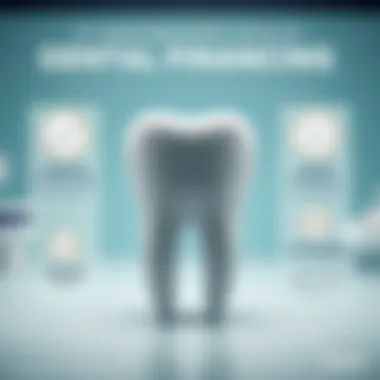Comprehensive Guide to Dental Financing Options


Intro
Dental expenses can take a whopping bite out of one's budget, especially when dental work cannot be ignored. Be it a routine cleaning or significant procedures like crowns or braces, the costs can add up. Many individuals find themselves scratching their heads, contemplating how they will manage to pay for these necessary services. Here, we will offer insights that can shed light on efficient ways to navigate dental financing.
Understanding the labyrinth of dental financing is crucial for anyone looking to maintain oral health without digging a deep financial hole. This journey through options and insights aims to unveil the often-overlooked methods that can help manage dental costs effectively.
Understanding Dental Financing
Grasping the realm of dental financing is akin to laying the groundwork for a sturdy financial future. It’s more than just numbers or payment plans; it embodies a crucial aspect of managing one’s health and wellness without breaking the bank. As dental care can often manifest as a hefty expense unexpectedly, understanding financing options can ease the potential burden on one's wallet, allowing individuals and families to seek necessary treatments without the daunting shadow of financial strain.
Definition of Dental Financing
Dental financing refers to the various methods employed to cover the costs associated with dental care. It includes a spectrum of options such as in-house financing plans, third-party loans, or even utilizing credit cards specifically earmarked for healthcare expenses. Essentially, these mechanisms provide patients a means to receive the dental services they need — be it a routine cleaning or a more complex procedure — while breaking the costs into manageable chunks.
In more technical terms, dental financing can be viewed as a bridge between the price tag of dental care and a patient’s immediate financial capabilities. Rather than needing to fork over the cash upfront, patients can opt for flexible payment arrangements or financing plans that allow them to pay over time. The importance here is clear; it’s about making dental care accessible, supporting not only physical health but also alleviating emotional anxiety that comes with hefty bills.
Importance for Patients
The significance of understanding dental financing cannot be overstated, especially for young professionals or students who often juggle finances while attempting to maintain a work-life balance. Here are some key points to consider:
- Affordability: Dental procedures can be pricey, and many patients find themselves in a bind if they don’t have the cash on hand. Financing options can transform a barrier into an opportunity, allowing individuals to seek treatments sooner rather than later.
- Health Priorities: When finances are not a concern, patients are more likely to prioritize preventive care. Regular check-ups and cleanings can take center stage, reducing the need for costly interventions down the line.
- Flexibility: Most financing plans are designed to accommodate varying budgets. This flexibility means patients can choose payment plans that fit their financial situation, making dental care less of a luxury and more of a standard health necessity.
- Informed Decision-making: Knowledge about available financing options equips patients with the ability to make educated choices regarding their healthcare. Understanding terms and conditions is part of navigating the often murky waters of financial options, ensuring patients don’t get trapped in high-interest plans or unexpected fees.
While dental financing might seem like a mere convenience, it influences healthcare decisions profoundly. It transforms the landscape of how patients approach their dental health, making care more attainable and systematic. As we delve into subsequent sections, it will become evident how these options can be leveraged effectively within the wider context of managing personal finances.
Types of Dental Financing Options
When it comes to keeping your pearly whites in tip-top shape, understanding the different types of dental financing options can make or break your experience. Each option has its own set of benefits, considerations, and potential pitfalls that might impact your financial health. By comprehensively covering the various types of financing available, you’ll not only make more informed choices but also align your dental care with your budget and needs.
In-House Financing Plans
Many dental practices offer in-house financing plans, representing a straightforward way to manage the costs associated with dental services. These plans usually come with flexible payment structures tailored to the specific situation of the patient. For instance, a local dental office might allow you to pay for your services in installments rather than one hefty payment upfront.
It's akin to breaking down a large pizza into smaller slices – more manageable and easier to digest. These in-house plans are generally interest-free if paid within the agreed timeframe. However, the key here is to clarify the total cost over time and ensure that there aren’t hidden fees creeping in, which could rain on your parade later.
Third-Party Financing
Third-party financing options are another useful avenue to explore. Companies like CareCredit or LendingClub have agreements with numerous dental practices, which allow patients to spread the payment over a longer term. With this, you might find a more feasible path to tackle larger treatments like crowns or implants without feeling as if you're emptying your wallet all at once.
However, be wary of the fine print. These arrangements often come with interest rates that can pile on the expenses if not managed properly. Taking time to compare different third-party lenders will help you leverage the best terms possible. Think of it like shopping for shoes – sometimes, the perfect fit is hidden in the clearance section.
Credit Cards for Dental Care
Using credit cards to finance dental care is another common route. When utilized responsibly, a credit card can serve as a handy tool, especially if you already have one with rewards or a low-interest rate. For small treatments such as fillings or cleanings, pulling out that plastic can be convenient – just make sure you’re ready to pay it off before interest accrues.
While many credit cards offer defined periods of zero interest on new purchases, be sure to read the stipulations. Timing and repayment strategies are key. After all, a small fee here and there can quickly translate into a larger financial headache down the road.
Medical Loans for Dental Procedures
For some patients, especially those facing extensive procedures that could bankrupt their budget in one go, medical loans specifically tailored for dental care can be an option worth considering. Unlike credit cards or in-house financing, medical loans often offer larger sums of money at lower interest rates, which can provide a financial lifeline for serious dental work.
Think about it: if you need to cover multiple procedures at once, a medical loan might just help you tackle it all without having to cover everything out-of-pocket initially. It's worth noting, however, that these loans require a decent credit score and adequate documentation to qualify. Check out your local financial institutions or online lenders, as they usually have dedicated programs for medical financing.
"Prioritize choices that align with your long-term financial health and situation."


Financing Applications: What to Expect
Understanding the financing application process is crucial for anyone looking to manage their dental expenses effectively. This section aims to break down the financing applications, shedding light on what patients can expect during this journey. It’s about clarity, avoiding surprises, and ensuring that everyone is equipped with the knowledge needed to make informed decisions.
Initial Consultation Process
The first step in obtaining dental financing typically begins with an initial consultation. This meeting is not just a chance to meet the dentist; it is a critical phase for discussing treatment options as well as payment methods. During this session, you can expect to discuss your dental health, the procedures needed, and how much they might cost.
This dialogue is paramount because it sets the stage for determining the kind of financing that suits you best. Dentists may present you with a variety of options—some might offer in-house plans, while others will have or recommend third-party financing. The discussion will let you gauge which route aligns with your financial situation. Additionally, many offices have staff trained to help you navigate payment plans and financing options. You shouldn't feel like you're going through this alone.
It’s also important to remember that this consultation is an opportunity for you, as a patient, to ask questions. Don't hesitate to inquire about the nitty-gritty of various financing options and what your responsibilities would be. This is not just about getting your teeth fixed; it involves making critical financial decisions that impact your wallet long term.
Required Documentation
When it comes to dental financing, preparing your documentation can make a significant difference in how smoothly the process unfolds. The paperwork you'll need varies depending on the financing method you choose, but there are some common requirements.
First and foremost, identification is key—most practices will require a government-issued ID to verify who you are. Next, proof of income is usually requested, especially if you opt for third-party financing. This could be recent pay stubs or tax returns that showcase your earning capacity.
Here’s a quick list of documents you might need:
- Photo ID: Government-issued identification to confirm your identity.
- Proof of Income: Pay stubs or tax documents that outline your financial situation.
- Previous Dental Records: If applicable, providing past dentist records could help in assessing your needs.
- Insurance Information: If you have dental insurance, this will help in determining what coverage assists with your planned dental work.
By being prepared with the right documents, you’ll be making the financing process smoother and faster. With everything organized, you can focus more on your treatment options rather than getting bogged down with paperwork. Just remember, being well-prepared can pave the way for a more straightforward and less stressful financing experience.
Key Considerations in Dental Financing
When it comes to dental financing, there are several key considerations to keep in mind that can make or break your financial health. Taking a close look at interest rates and fees, monthly payment structures, and flexibility in payment options will provide clarity and guide you in making informed choices.
Interest Rates and Fees
One of the first things young professionals, students, and small business owners should scrutinize is the interest rates associated with dental financing. Rates can vary widely between options—some may appear reasonable at a glance, while hidden fees could leave you paying more than expected. Often, dental practices partner with financing companies, and the terms can range from zero percent for a promotional period to much higher rates once the period expires.
It's crucial to ask about any associated fees as well. Perhaps you'll encounter initiation fees, late payment penalties, or even processing fees. These nuances can significantly inflate your overall costs. A little due diligence here can save you big bucks later.
In general, taking the time to compare offers can illuminate options that may suit your financial situation better. Shop around and look for deals that other patients recommend; online forums like Reddit can provide real-world insights. In summary:
- Compare interest rates among various providers.
- Inquire about hidden fees that could surface later.
- Consider customer experiences to gauge reliability.
Monthly Payment Structures
The next aspect to consider is the monthly payment structure. Each financing option typically comes with its own arrangement for how payments are scheduled. Some may choose a fixed payment plan, where the amount remains constant throughout the payment period, making budgeting easier. Others may propose variable structures that could adjust with time, leading to uncertainty.
Let's not forget to examine the length of the repayment term, too. While a longer duration may result in smaller monthly payments, it often means you'll end up paying more in interest over time. Striking a balance between manageable monthly payments and overall cost is essential for maintaining financial well-being. Here are some pointers:
- Opt for fixed payments if you prefer predictability.
- Consider your ability to pay more in the early years if that option exists. It might save you money.
- Look for a term length that aligns with your overall financial goals.
Flexibility in Payment Options
Finally, we arrive at flexibility—an increasingly important consideration for many in today's fast-paced world. Having a flexible payment option can bridge the gap between unexpected expenses and planned dental work.
Some practices offer payment plans that allow you to adjust payments temporarily in case of financial hardships. Furthermore, a practice that accepts a variety of payment methods—including credit cards or even cryptocurrencies—can offer greater convenience that suits your lifestyle.
Flexibility also extends to the ability to negotiate terms or adjust repayment terms if circumstances change. Being able to engage in open communication with financial institutions can ease tension when unexpected costs arise.
In summary:


- Look for practices that offer a range of payment methods.
- Consider asking for custom payment plans that reflect your financial timeline.
- Seek options that accommodate financial shifts in your life, ensuring peace of mind.
Understanding these key considerations is invaluable. They can significantly impact your choices and keep you firmly on the path to financial security while seeking necessary dental care. Whether you're budgeting for braces or a routine checkup, grasping these factors gives you control over your financial decisions.
Arming yourself with this knowledge empowers you to navigate dental financing wisely and could save you both money and stress in the long run.
The Impact of Dental Financing on Personal Finances
When it comes to managing healthcare costs, dental expenses can often slip under the radar, yet their impact on personal finances can be considerable. Understanding how dental financing works is crucial for anyone looking to keep their financial house in order. The right financing option not only alleviates immediate monetary pressure but also sets the stage for a healthier financial future.
Budgeting for Dental Costs
Crafting a budget specifically for dental expenses is essential. Just like you would allocate funds for groceries or rent, dental care should have its own line in your budgetary breakdown. After all, dental health can have long-lasting implications for your overall well-being and, consequently, your finances.
- Establish a Baseline: Begin by looking at past dental bills. Find out how much you spent over the last couple of years and adjust that with expected upcoming treatments such as cleanings, fillings, or even braces. This will give you a ballpark figure to work with.
- Plan for the Unexpected: Dental emergencies can throw a wrench into the best-laid plans. Allocate a portion of your budget for unforeseen expenses, which could be a lifesaver if you suddenly need a root canal.
- Monthly Set-Asides: Consider setting aside a specific amount each month in a separate savings account earmarked for dental expenses. This approach prevents the financial shock when it’s time for that six-month check-up, reducing reliance on high-interest financing options later on.
Managing Debt from Dental Financing
It’s all too common for individuals to fall into a spiral of debt from dental financing, especially when dealing with extensive treatments. Just as a double-edged sword can cut both ways, financing can be a help or a hindrance depending on how you handle it. Keeping the following aspects in check can make a significant difference:
- Know Your Terms: Always read the fine print. Some dental financing plans come with steep interest rates, turning a manageable bill into a heavy burden over time. Understanding your repayment structure can save you from incurring more debt than you bargained for.
- Keep Track of Payments: Set reminders on your calendar for payment due dates. Late fees can quickly pile up. Use budgeting apps or simple spreadsheets to track how much you owe; being organized can keep your finances from spiraling out of control.
- Communicate with Your Dentist: If you find yourself struggling to keep up, don’t shy away from reaching out. Many dental providers are more flexible than you might expect and could offer alternatives like a revised payment schedule or additional financing options.
"Being proactive about dental financing today can keep your tomorrow free of concerns. Don't let unexpected dental bills control your financial future."
Alternatives to Dental Financing
Exploring options outside traditional dental financing can be a game changer for those looking to manage their dental expenses effectively. Alternatives not only open up avenues for covering costs but also help to minimize reliance on loans that could burden one’s financial health. Understanding what these alternatives are is key to making informed decisions—especially when dental care can be unexpectedly pricey. Let’s take a closer look at two noteworthy avenues: dental insurance options and government assistance programs.
Dental Insurance Options
Dental insurance is often the first stop for many when considering ways to alleviate the cost of dental care. Unlike the episodic nature of most health insurance, dental plans typically operate within a structured framework that benefits routine care. These policies usually cover a percentage of preventive treatments such as check-ups and cleanings, which can help catch issues before they escalate.
- Understanding Coverage
The type of coverage varies significantly among providers. You might find that basic plans cover 100% of routine check-ups but offer only 50% coverage on more complex procedures like crowns or root canals. Make sure you read the fine print on what’s included and excluded. - Annual Maximums
Most dental insurance plans have a cap on how much they will pay annually. Commonly, this limit can range from $1,000 to $2,000. If treatment costs exceed this limit, the patient must bear the additional expenses. So, it pays to plan ahead. - In-Network versus Out-of-Network
Many dental plans have a network of dentists that provide care at reduced rates. Patients opting for out-of-network care can often expect to pay higher fees. Researching local options and confirming that your provider is in-network can save money.
Ultimately, while dental insurance wasn’t a silver bullet, it can significantly lessen the overall financial burden of dental care. Patients might find that the routine care they receive through their plan enhances not only their smiles but their long-term health as well.
Government Assistance Programs
For those particularly in need, government assistance programs can also provide relief. These programs may vary by state and can be a lifeline for low-income individuals or families needing dental care.
- Medicaid
In many states, Medicaid offers dental benefits as part of the health care coverage it provides. The level of coverage can differ drastically between states, though. Some may include comprehensive dental coverage for children, while adults might face limits. It’s crucial to check each state’s Medicaid guidelines to see what’s available. - Child Health Insurance Program (CHIP)
This program is designed for families who earn too much to qualify for Medicaid, but still can’t afford private insurance. CHIP generally covers dental exams, cleanings, and necessary procedures for children under 19 years old. Check local listings for eligibility requirements. - State-Specific Programs
Beyond Medicaid and CHIP, some states have specific programs aimed to help residents access affordable dental care. These can include clinics that offer services on a sliding scale, meaning that costs decrease based on income. Connecting with local health departments or community health organizations can help locate these resources.
Finding a Dentist Offering Financing
Finding a dentist that offers financing options is a pivotal step for managing dental costs, especially in a landscape where out-of-pocket expenses can quickly spiral for treatments. If you’re looking to maintain good oral health without breaking the bank, understanding how to locate dental practices that provide these options can make all the difference. This section outlines specific benefits and essential considerations that can ease the burden of dental expenses.
Securing dental services often requires a significant financial commitment. Practices that offer financing not only enhance access to care but also facilitate a transparent financial planning process for patients. This becomes especially crucial when you need complex treatments like root canals or crowns, where costs tend to add up. By choosing a dental care provider that embraces flexible payment solutions, patients can better navigate unexpected expenses.
Researching Local Practices
The first step in finding a dentist that accommodates financing options is to do your homework. Here are some practical strategies:
- Online Search: Leverage search engines to look up local dental practices. Phrases like "dentists with financing options near me" can yield valuable results. Websites like Yelp or Healthgrades can help you read reviews, and assess the offerings of different clinics.
- Social Media Insights: Checking platforms such as Facebook or Reddit can provide patient experiences and insights about financing options. These platforms can reveal which clinics provide the kind of flexible payment plans you're looking for.
- Consultation Calls: Don't hesitate to call local practices and inquire directly about their financing options. Engaging in a conversation can often provide clarity on their policies and any hidden fees that may apply.
- Community Boards: Look into local community boards or groups online where fellow residents share recommendations. This can provide firsthand accounts of experiences with payment plans and financing options.
Being proactive in your research not just equips you with information but ensures that you are making an informed decision that aligns with your financial situation.


Evaluating Financing Options Provided
Once you've pinpointed a few practices that offer financing, the next step is to thoroughly assess their options. Be discerning and consider the following points:
- Types of Financing Available: Does the practice offer in-house financing or partner with third-party lenders? Each option has its own pros and cons that should match your financial needs.
- Interest Rates and Terms: Understand the terms of the financing. Are there interest charges? Are the terms reasonable? Being cognizant of these factors can prevent unexpected burdens down the line.
- Payment Flexibility: Check if the dentist provides multiple payment plans. Some may offer no-interest plans if paid in a certain period. Others might have monthly installments that fit your budget. Assessing your own financial capacity will help you decide what works best.
- Hidden Fees: Be on the lookout for any fees that may not be immediately apparent. This includes set-up fees, late payment penalties, or additional costs associated with the plans.
- Patient Reviews: Read patient testimonials focusing on their experience with financing through the dental practice. Look specifically for comments on how well the office communicates and assists with financing queries.
By taking the time to evaluate these elements, you set yourself up for a more favorable dental financing experience, ultimately paving the way for better oral health without financial strain.
"Knowledge is power, especially when it comes to managing dental costs. Taking the time to research and assess can lead to significant savings."
Making informed decisions with respect to dental financing allows you to enjoy quality care while safeguarding your financial health.
Navigating Potential Pitfalls in Dental Financing
Dental financing can be a blessing for many individuals facing oral health issues that require attention but might be strained under budget constraints. However, like with many financial avenues, there are pitfalls that can catch even the most diligent consumers off guard. Understanding these potential stumbling blocks is crucial, particularly for those who might not have dealt with large medical bills before.
"An ounce of prevention is worth a pound of cure."
Knowing what to look out for can save you headaches, debt, and emotional stress later on. When considering financing options, it's essential to navigate with care to avoid traps that can lead to unexpected expenses. Thus, weighing your options carefully and asking the right questions can prevent a simple dental procedure from turning into a financial burden that weighs heavily on your mind.
Understanding Terms and Conditions
Every financing option comes with a set of terms and conditions. This is where many individuals trip up. When you start reading the fine print, it can feel like gazing into a labyrinth. Learning to decipher this maze is a necessary skill.
For instance, often, people overlook annual fees or late payment penalties that could be lurking in the fine print. You might come across jargon like APR—Annual Percentage Rate, which essentially denotes the cost of borrowing annually. Not parsing this number can lead to decisions that may seem favorable on the surface, but don’t hold up in the long run.
Additionally, find out if there are restrictions on what procedures can be financed. Some plans might sound appealing, yet they may limit the kind of treatments you can undergo. Be sure to ask:
- Are there specific services excluded?
- Is there flexibility in payment?
Make sure you're absolutely clear on the repayment schedule too. Knowing how long you'll be paying, and whether the payments will be fixed or variable, sheds light on what you're truly dealing with financially. A little bit of time invested in comprehending these details can pay dividends.
Avoiding Common Financing Mistakes
Without smart decisions, even the best financing options can lead to regret. Here are some common mistakes that people often make:
- Rushing to Sign: Don’t ever rush through this process; take your time. Signing a contract without fully understanding it is akin to a ship sailing without a compass.
- Ignoring Total Costs: It might be easy to focus on monthly payments. However, you need to view the financing in its entirety. That means looking at total interest and all fees over the lifetime of the loan.
- Not Comparing Options: Quite frankly, shopping around isn’t just for groceries. Every dental practice may provide its own financing plan or collaborates with different third-party lenders. A single call could reveal multiple options, all with varying terms.
- Missing Out on Promotions: Some practices offer promotional financing, like no interest payment plans for a certain period, often for varying procedures and services. This can make a massive difference if you can manage to pay within that promotional timeframe.
Avoiding these pitfalls requires diligence and a touch more patience than most people may want to exert. Ultimately, the decisions you make regarding dental financing can carry consequences that stretch far beyond a mere dental appointment. An informed consumer is a powerful one, and knowing these pitfalls helps you make better choices that align with your long-term financial well-being.
Ending: The Path Forward
In a world where dental health is often sidelined due to financial constraints, understanding the nuances of dental financing becomes paramount. This conclusion isn't merely an afterthought; it's a synthesis of insights gathered throughout our exploration. As we've navigated through various options available for financing dental procedures, the overarching message emerges clearly: making informed decisions can significantly influence both health and financial well-being.
Making Informed Choices
The journey of selecting a suitable dental financing option should be approached with careful consideration. This isn't about picking the first offer that comes your way; it’s akin to choosing a car—you wouldn’t buy the first model you see without doing your homework, right? Here are a few tips:
- Understand Your Needs: Assess what dental work you need—whether it's routine cleanings, fillings, or more extensive procedures like crowns or implants. Different treatments come with varying costs.
- Research Financing Options: Dive into the specifics of each financing option. Are there hidden fees associated with in-house plans? What are the interest rates for third-party lenders?
- Calculate Total Costs: Don’t just look at monthly payments; consider how much you'll actually pay over time. For instance, a plan that seems cheap upfront may be costly due to high-interest rates.
- Consult with Professionals: Don’t hesitate to speak with your dentist or financial advisor. They can provide insights tailored to your financial situation, helping you weigh the pros and cons of each option.
Making rational, well-informed choices when it comes to dental financing not only mitigates financial strain but also cultivates a sense of empowerment in your health care journey.
Emphasizing Financial Health in Dental Decisions
Dental procedures should not be an added strain to your financial health. Like any responsible financial decision, it requires balancing your desire for quality care with your budgetary constraints. Remember, maintaining your dental health is a long-term investment, one that can lead to significant savings down the line.
- Establish a Budget: Before diving into financing options, outline your budget for dental expenses. This will help you identify which services you can afford and what financing routes align with your financial landscape.
- Consider the Long-Term Impact: Some procedures, if postponed due to cost, can lead to more serious problems later on. Ignoring dental issues now might result in higher costs and extensive treatments down the road.
- Stay Informed on Your Rights: Understanding terms and conditions helps protect your rights in these financial agreements. Sometimes, patients may overlook clauses that could be unfavorable to them in the long run.
It's crucial to think not just about immediate affordability, but how your dental financing choices will affect your overall financial health in the years to come.
In summarizing, navigating through the maze of dental financing can feel cumbersome, yet with diligent research and a clear understanding of your options, you can step forward with confidence. Keep your financial health in mind as you pursue necessary dental care. After all, healthy teeth and a steady financial footing go hand-in-hand.















